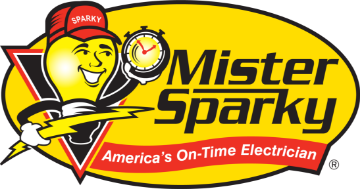Home Generator Installation
October 26, 2022
Is a home generator right for you? Making this big purchase can come with a lot of questions, so Mister Sparky put together a list to help you make a decision about your purchase, and your home generator installation.
1) KNOW YOUR SURROUNDINGS
Do you have neighbors that are relatively close? Will you be installing a home generator on the same side of the house as your bedroom or main living area? If so, then be sure to look for the quietest unit possible. The decibel or loudness rating of each generator is readily available usually. You can find extremely quiet units that are as quiet or quieter than a typical outdoor heat pump.
2) DO YOU WANT THE GENERATOR FOR WHOLE HOUSE OR MOST OF THE ESSENTIALS?
Remember as the size of the generator gets larger, the bigger of an investment will be required. However, some must haves that can be powered via generator include a heat or cooling source (lots of ways to accomplish this depending on what type of heat you have), water (well and or electric hot water tank), refrigerator, freezer, septic system, cooking source (microwave and or small burner plate works great and can save you from a larger generator), communications (like phone, modem and routers), lights and receptacles to get you ready in the morning. And of course the coffee pot!
3) A PROFESSIONAL SHOULD PERFORM YOUR HOME GENERATOR INSTALLATION
You could purchase the best system in the world, however the most important day in the life of your new whole house generator system is the day it’s installed. Make certain the installer is licensed and bonded, and make sure they have done lots of these installations. Then, ask to see other projects they’ve done or if you can call the past 2-3 customers they installed generators for like yours, do so.
Some of the things you should be finding out include whether they seem thorough and intelligent about the product and if they are able to offer solutions to problem area. Ask if they take down calculations for the gas appliances and make sure your gas meter or propane tank will accommodate the new home generator system. If they are not asking these things, find a different installer. Making sure your new generator will work with your existing natural gas or propane system is possibly the most important solution electricians should be able to answer and solve.
4) COMPARE WARRANTIES AND GUARANTEES ON GENERATOR AND INSTALLATION
After the installation is done, can your home generator electrician support you if there is a problem? What assurances do they give you? Do they just want to install it and then not service it? If so, I would stay away from that installer and go with one that will take care of you and support you through the life of your system.
5) MAKE SURE YOU HAVE WHOLE HOUSE SURGE PROTECTION INSTALLED
Make sure you have whole-house surge protection installed not only on your home electrical panels but on the emergency back up generator panel that is controlled by the generator as well. While home generators today deliver very stable and reliable power quality, you never want to take a chance with all your homes electronics on the system. It’s a fairly inexpensive item that provides a very large amount of protection. They also have their own warranty that will give you lots of peace of mind as well..
